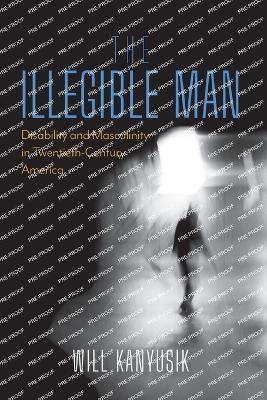
The Illegible Man
Disability and Masculinity in Twentieth-Century America
Seiten
2025
Indiana University Press (Verlag)
978-0-253-07179-8 (ISBN)
Indiana University Press (Verlag)
978-0-253-07179-8 (ISBN)
- Lieferbar (Termin unbekannt)
- Versandkostenfrei
- Auch auf Rechnung
- Artikel merken
How does the sudden onset of disability impact the sense of self in a person whose identity was, at least in part, predicated on the possession of what is culturally understood to be an "able" body? How does this experience make visible the structures enabling society's shared notions of heteronormative masculinity?
In the United States, the Second World War functioned as a key moment in the emergence of modern understandings of disability, demonstrating that an increased concern with disability in the postwar period would ultimately lead to greater incoherence in the definitions and cultural meanings of disability in America. The Illegible Man examines depictions of disability in American film and literature in twentieth-century postwar contexts, beginning with the first World War and continuing through America's war in Vietnam. Will Kanyusik searches for the origin of discourse surrounding disability and masculinity after the Second World War, examining both literature and film—both fiction and documentary—their depictions of disability and masculinity, and how many of these texts were created by the relationship between the culture industry and the Office of War Information in the 1940s.
Supported by original archival research, The Illegible Man presents a new understanding of disability, masculinity, and war in American culture.
In the United States, the Second World War functioned as a key moment in the emergence of modern understandings of disability, demonstrating that an increased concern with disability in the postwar period would ultimately lead to greater incoherence in the definitions and cultural meanings of disability in America. The Illegible Man examines depictions of disability in American film and literature in twentieth-century postwar contexts, beginning with the first World War and continuing through America's war in Vietnam. Will Kanyusik searches for the origin of discourse surrounding disability and masculinity after the Second World War, examining both literature and film—both fiction and documentary—their depictions of disability and masculinity, and how many of these texts were created by the relationship between the culture industry and the Office of War Information in the 1940s.
Supported by original archival research, The Illegible Man presents a new understanding of disability, masculinity, and war in American culture.
Will Kanyusik is Associate Professor of English at Loras College.
Acknowledgments
Introduction
1. Disability, Masculinity, and the Problem of Legibility in Postwar American Fiction
2. From Trust to Suspicion: Disability, Masculinity, and the American Culture of Scrutiny in the War Department Documentary
3. Tactile Visions: Disability, Prosthesis, and the Problem of Recognition in Postwar American Cinema
4. Returns and Repressions: Economies of Violence and Anxieties on the Home Front
5. Landscapes of Loss: Disability, The American Wilderness, and the Remasculinization of the Vietnam Veteran
Coda: Disability, Resilience, and the Cost of American Hegemony under Neoliberalism
Bibliography
Index
| Erscheinungsdatum | 19.11.2024 |
|---|---|
| Zusatzinfo | 9 b&w illus. |
| Verlagsort | Bloomington, IN |
| Sprache | englisch |
| Maße | 152 x 229 mm |
| Themenwelt | Geschichte ► Allgemeine Geschichte ► Zeitgeschichte |
| Sozialwissenschaften ► Soziologie ► Gender Studies | |
| ISBN-10 | 0-253-07179-8 / 0253071798 |
| ISBN-13 | 978-0-253-07179-8 / 9780253071798 |
| Zustand | Neuware |
| Haben Sie eine Frage zum Produkt? |
Mehr entdecken
aus dem Bereich
aus dem Bereich
Gewalt, Umwelt, Identität, Methode
Buch | Softcover (2024)
Spector Books OHG (Verlag)
CHF 49,95
wie Freud im Kollektiv verschwand
Buch | Hardcover (2024)
Klett-Cotta (Verlag)
CHF 34,95


